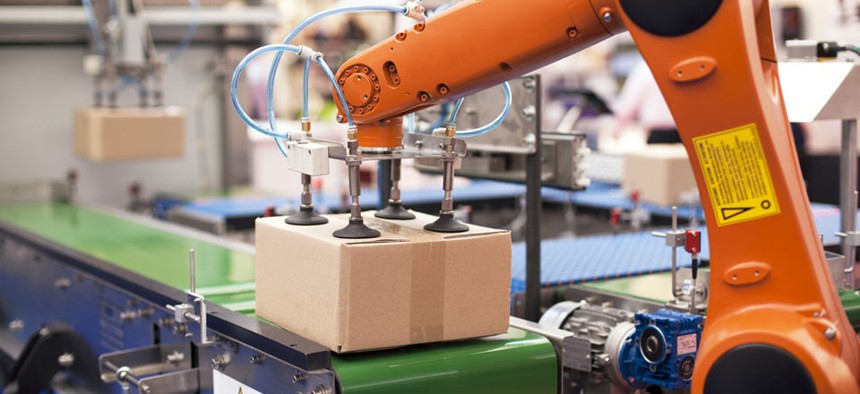Economists Say Robots Will Have Dire Effect on US Economy

wellphoto/Shutterstock.com
A new study explores various scenarios for an economy increasingly powered by robots, and none of them look great for human workers.
They clean our floors, assemble parts in our factories, beat us at chess and feed us tomatoes. Robots are becoming ubiquitous, and economists from Boston and Columbia Universities say they will have a dire effect on the US economy.
A new study published this month by the US National Bureau of Economic Research explores various scenarios for an economy increasingly powered by robots, and none of them look great for human workers.
The basic situation they predict is bleak: As robots perform more efficiently than humans, businesses invest in robots that can cut workforce costs. The constant need for new technology leads to increased tech salaries and costs of services. That tech boom, the authors argue, will eventually cause its own bust.
Over time, developers will actually put themselves out of work, they say. The robots developers build will be able to handle increasingly complex work, meaning fewer workers will be needed to maintain the machines built by the last generation of developers. It will also take fewer people to build each new generation of robots, as construction of robots will be automated and based on the old models.
“When smart machines replace people, they eventually bite the hands of those that finance them,” the researchers explain. (They’re not the only ones worried about a Terminator-like future—even the tech guru Elon Musk fears that something apocalyptic might unfold.)
The working paper, which has not been peer-reviewed, models several different futures, with names ranging from the dystopian (“Immiserating Growth”), to the revolutionary (“The First Will Be Last”).
“The long run in such cases is no techno-utopia,” the paper warns.

One outcome sees a spike in need for welfare as a large portion of the workforce is replaced by robots, and the authors suggest that we humans should start saving now to weather the likely depression that will follow the robot boom. Another outcome suggests that 68% of high-tech workers will have to move into the service sector, forcing lower-skilled workers from their jobs.
It’s perhaps not terribly surprising that robot manufacturers are saying the fears are overblown, and human jobs are safe (paywall). The industry is still far from replicating the precision of human performance, said Junji Tsuda, the chairman of robotics company Yaskawa Electric, in an interview with the Financial Times. And he doesn’t see that gap in robot technology closing anytime soon: “They’re not going to develop on an exponential curve, like computers. It’s going to be linear, steady growth,” he said.
Be that as it may, entry-level and low-skilled jobs seem to be already evaporating in the US. In the New York Times’ recent exploration of middle-class job fields in the US, the fields that showed the sharpest declines were related to manufacturing or clerical work, jobs that can be easily undertaken by robots and computers.
At which point, perhaps the old adage holds true: If you can’t beat them, join them.
(Image via wellphoto / Shutterstock.com)





